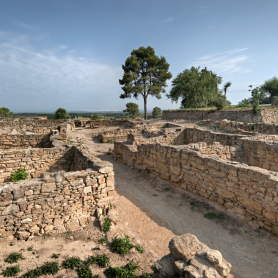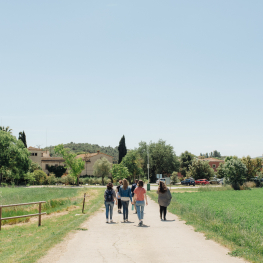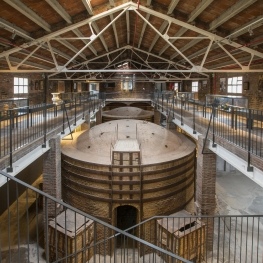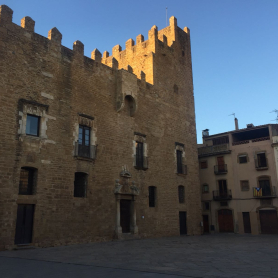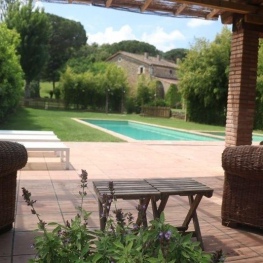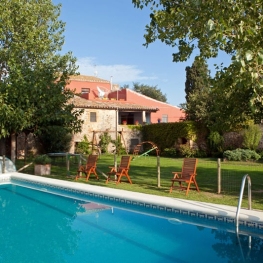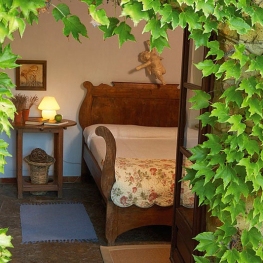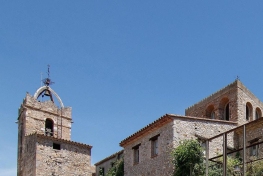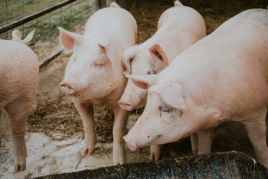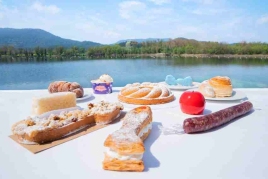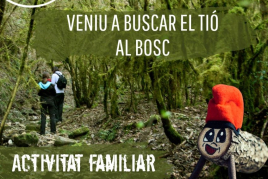Ruta del Ter by Celrà, Bordils, Sant Joan de Mollet and Flaçà
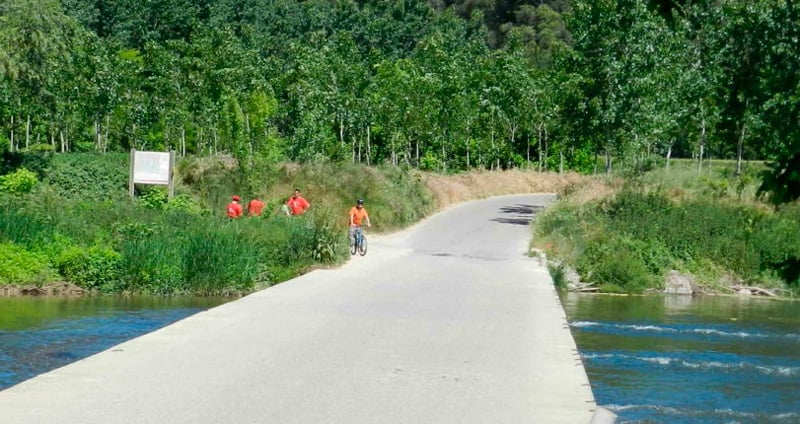
The Ter route is a great route designed and managed by the Consortium of Ter that links Ulldeter with the Gola del Ter, circulating whenever possible by the roads closest to the river.
Throughout the route you can follow the green bicolour signs and garnets with a small white ripple in the center.
In 2015, a new branch of the Ter route started in Celrà and runs along the whole agricultural plain on this side of the river. The new section passes through the towns of Bordils, Sant Joan de Mollet and Flaçà, where it finally connects with the main road of the Ter route, which in this area flows through the left iles until crossing the pass of Sobrànigues and heading towards the sea.
 The route of the Ter-Gavarres is a route of union between the municipalities on both sides of the river, but it must be remembered that it is not a circular route, therefore it will be necessary to take into account that the return will be made by the same road. You can also choose to take the railway linking Celrà, Bordils, Flaçà and Sant Jordi Desvalls to avoid at least a piece of the route.
The route of the Ter-Gavarres is a route of union between the municipalities on both sides of the river, but it must be remembered that it is not a circular route, therefore it will be necessary to take into account that the return will be made by the same road. You can also choose to take the railway linking Celrà, Bordils, Flaçà and Sant Jordi Desvalls to avoid at least a piece of the route.
The map that is attached to the end of the route highlights the route of the Ter route in the right zone, as well as the main route. The altitudinal profile and the distance that is reflected make reference to the section between the beginning in the train station of Celrà and the mill of Vinyals in Flaçà, where it connects with the original way. Thus, the approximately 13.5 kilometers indicated on the map value the distance between these two points of the route.
The itinerary is practically level and perfect to do in family, on foot or by bicycle, and in a relaxed way enjoying the scenery of the surroundings of the river that hide great amount of natural as well as cultural heritage.
Beginning the route in Celrà, it is part of the train station located before the complex Pagans Factory, a reference of the Catalan industrial modernism. Follow the vertical signs that indicate the path, as well as the marks of the Ter path itself. You leave the village quickly through the torrent of Noria, which passes under the train track and the road to Palamós, and skirts the industrial estate to enter the agricultural plain.
Shortly after the route passes next to the Island of the Sauces, a small clearing of riverside forest where you can observe the great biodiversity of these fluvial ecosystems so scarce and fragile.
The route continues to the treatment plant where you have to turn left. In this section you have to be aware of the marks of the route so that you will turn left again in the next farmhouse, Can Simon, and later you will have to do the same once past the most ruinous of can Verneda.
 Now the route circulates by the northern margin of what had been a republican airfield between 1937 and 1939. Here you can visit both the powder magazine of the field, and an antiaircraft refuge that are on foot.
Now the route circulates by the northern margin of what had been a republican airfield between 1937 and 1939. Here you can visit both the powder magazine of the field, and an antiaircraft refuge that are on foot.
Then you will reach the monumental oak of La Canova, where you will take the road to the left following the Bando (the aligned plantations of trees) that characterizes the landscape of this area of the Ter. The route will turn right to go directly to Bordils where you can not miss the visit to the church of San Esteban, a spectacular construction of Gothic style with Renaissance details that contrasts a lot with the rest of Romanesque churches of the area.
The route is taken on the street of the Cross where there is a public lavatory of 1932, a space of socialization of the towns where they come expressions like " fer safareig " to talk about the gossip.
Once past the neighborhood of Rissec, the route crosses the stream of Sant Martí Vell in the spot of La Palanca, a beautiful shady and cool space.
The following points of interest are the villages of San Juan de Mollet and Flaçà. Located on a small elevation of the plain, the church of San Juan strongly presides over the surrounding landscape. Then the route crosses the old town of Flaçà, very well preserved and cared for.
Finally, you will reach the mill and the hydroelectric plant at Vinyals. In the mill an industrial building was built in s. XIX and a tower that give it a unique look. In the back are the locks, as well as the small hydroelectric power station of Noucentista style. Following the path of the hydroelectric power station you can reach the train bridge, the work of the French engineer Eiffel.
This branch of the Ter route ends here, although if you are keen you can continue to Cervià de Ter, where you can visit the old town and especially the monastery of Santa Maria de Cervià and the castle of Cervià, the first a church And monastery Romanesque very well preserved, and the second a privileged watchtower on all the Ter-Gavarres and the Empordà.
What to do
Ciutat ibèrica d'Ullastret
Ullastret (a 11.3 Km)Discover the largest Iberian city in Catalonia, a fascinating site in the…
Experiència #APROP - Llet Nostra
Cruïlles, Monells i Sant Sadurní de l'Heura (a 8.5 Km)Live the #APROP experience and discover everything that is hidden behind a…
Terracotta Museu de Ceràmica
La Bisbal d'Empordà (a 12.5 Km)The Terracotta Ceramic Museum aims to preserve and disseminate the scientific, technical…
Castell Palau de la Bisbal d'Empordà
La Bisbal d'Empordà (a 12.1 Km)The Castell Palau of the Bishops of Girona is an outstanding example…
Where to sleep
Casa Rural Mas Masaller
Cruïlles, Monells i Sant Sadurní de l'Heura (a 13.2 Km)Isolated farmhouse almost 3 kilometres from La Bisbal de Empordà. The farmhouse…
La Plaça de Madremanya
Madremanya (a 6.3 Km)Hotel in an old farmhouse s. XIV-XV located in the center of…
Allotjament Rural Casa Bàscara
Bàscara (a 12.9 Km)Disconnect and enjoy the tranquility and serenity offered by the Casa Bàscara…


